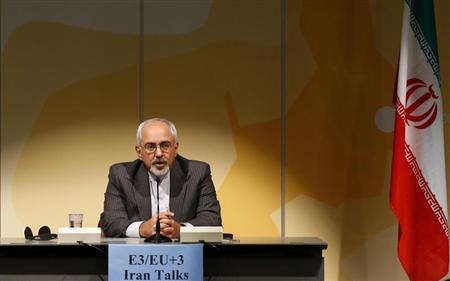 (Reuters) -�Iran�and six world powers are making progress in talks aimed at ending a decade-long nuclear stand-off between Tehran and the West, but the discussions are "tough", Iran's foreign minister said on Thursday.
(Reuters) -�Iran�and six world powers are making progress in talks aimed at ending a decade-long nuclear stand-off between Tehran and the West, but the discussions are "tough", Iran's foreign minister said on Thursday.Mohammad Javad Zarif made the comment to Reuters after a first session in the two-day negotiations in Geneva, which are seeking to build on a diplomatic opening after the June election of Hassan Rouhani, a relative moderate, as Iran's new president.
The powers hope to reach a "first step" deal to ease concern over Tehran's nuclear program - which the West fears may be aimed at developing a nuclear weapons capability - though both sides say a breakthrough is far from certain.
Iran, which says its nuclear program is a peaceful energy project, wants them to start lifting tightening sanctions that are severely damaging the OPEC producer's economy.
Both sides have limited space for compromise, with hardliners in Iran and hawks in Washington likely to denounce any concession they see as going too far.
"The talks went well," Zarif told Reuters after the morning session between Iran, the United States, Britain, France, Germany, Russia and�China. "I'm hopeful that we can move forward. We are making progress, but it's tough," he said.
Iran's Deputy Foreign Minister Abbas Araqchi said he hoped a deal could be struck but that the sides remained far apart.
"The differences are widespread and deep. This is undeniable. And continuing the negotiations will not be an easy task, but this does not cause us to lose hope," he said, adding he was still hopeful a "final understanding" could be reached.
A spokesman for European Union foreign policy chief Catherine Ashton, who is coordinating talks with Iran on behalf of the powers, described the morning session as "good" but declined to give details.
Michael Mann also said discussions would continue in smaller groups in the afternoon before Ashton and Zarif, who also had a breakfast meeting, were due to meet again.
"The talks are extremely complex and they are now getting into a serious phase. We very much hope there will be concrete progress here in the next couple of days," he told reporters.
ROLLING BACK NUCLEAR PROGRAMME?
The United States and its allies say they are encouraged by Tehran's shift to friendlier rhetoric since the election of Rouhani. Following years of hostility, Rouhani has promised to try to repair ties with the West and win relief from sanctions.
But the Western allies say Iran must back its words with action and take concrete steps to scale back its atomic work.
"What we're looking for is a first phase, a first step, an initial understanding that stops Iran's nuclear program from moving forward and rolls it back for the first time in decades," a senior U.S. official said on the eve of the talks.
That would help buy time needed for Iran and the powers to reach a broader diplomatic settlement in a dispute that could otherwise plunge the Middle East into a new war.
The six nations want Iran to suspend its most sensitive uranium enrichment efforts, reduce its stockpile of such material and diminish its capacity to produce it in the future.
In return for any concessions, Iran wants the powers to lift the sanctions that have slashed its oil revenues by 60 percent in the past two years and devalued its rial currency by more than half.
The exact nature of a possible first step remain unclear, but the six nations are unlikely to agree on anything less than a suspension of enrichment of uranium to 20 percent fissile purity, a level that constitutes a major milepost on the way to making weapons.
The U.S. official said Iran at this stage must address important aspects of its nuclear program, including sufficient international monitoring. Iran's construction of a research reactor near the town of Arak is also a growing concern for the West because it could yield plutonium for bombs.
SANCTIONS PRESSURE
A senior aide to a U.S. senator briefed by the White House and State Department said Washington would offer to work with Iran in a six-month confidence-building period. During that time, Washington would offer Tehran relaxed restrictions on Iran's funds held in overseas accounts. It could also ease sanctions on trade in gold and petrochemicals.
In exchange, Iran would stop enriching uranium to 20 percent and convert its existing stockpile of 20 percent uranium to an oxide form suitable for processing into reactor fuel and take other measures to slow the program.
The aide said the concessions being sought would "neither freeze nor set back" Iran's nuclear program and that the Senate would have to act immediately to impose further sanctions on Iran.
The House of Representatives overwhelmingly passed a new sanctions bill in July that aims to reduce Iran's oil exports to a trickle in a year. The Senate's banking panel had been expected to introduce its version of the bill in September, but the Obama administration has pushed it to delay the new legislation in order to give the Geneva talks a chance.
Western diplomats are hesitant to divulge specifics about the talks due to sensitivities involved.
An Israeli official said on Wednesday the six powers and Iran were expected to discuss an agreement that would fall far short of Israeli expectations, describing it as a "bad deal".
Widely assumed to be the Middle East's only nuclear power, Israel views Iran as a threat to its existence and has warned it could launch pre-emptive strikes against Iranian nuclear sites if diplomacy fails to stop the program.
By Reuters
The Iran Project is not responsible for the content of quoted articles.











